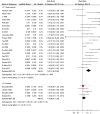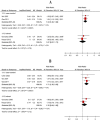Red and processed meat consumption and gastric cancer risk: a systematic review and meta-analysis
- PMID: 28430644
- PMCID: PMC5444765
- DOI: 10.18632/oncotarget.15699
Red and processed meat consumption and gastric cancer risk: a systematic review and meta-analysis
Abstract
The associations between red and processed meat consumption and gastric cancer risk have remained inconclusive. We performed a systematic review and meta-analysis to analyze these associations. We searched PubMed and EMBASE to identify studies published from inception through October 2016. Subtype analyses of gastric cancer (gastric cardia adenocarcinoma and gastric non-cardiac adenocarcinoma) and dose-response analyses were performed. We finally selected 42 eligible studies. The summary relative risks of highest versus lowest consumption were positive for case-control studies with 1.67 (1.36-2.05) for red meat and 1.76 (1.51-2.05) for processed meat, but negative for cohort studies with 1.14 (0.97-1.34) for red meat and 1.23 (0.98-1.55) for processed meat. Subtype analyses of cohort studies suggested null results for gastric cardia adenocarcinoma (red meat, P = 0.79; processed meat, P = 0.89) and gastric non-cardiac adenocarcinoma (red meat, P = 0.12; processed meat, P = 0.12). In conclusion, the present analysis suggested null results between red and processed meat consumption and gastric cancer risk in cohort studies, although case-control studies yielded positive associations. Further well-designed prospective studies are needed to validate these findings.
Keywords: diet; gastric cancer; meta-analysis; processed meat; red meat.
Conflict of interest statement
There is no conflict of interest for each author.
Figures






Similar articles
-
Association Between Consumption of Red and Processed Meat and Pancreatic Cancer Risk: A Systematic Review and Meta-analysis.Clin Gastroenterol Hepatol. 2017 Apr;15(4):486-493.e10. doi: 10.1016/j.cgh.2016.09.143. Epub 2016 Sep 28. Clin Gastroenterol Hepatol. 2017. PMID: 27693521
-
Red and processed meat consumption and esophageal cancer risk: a systematic review and meta-analysis.Clin Transl Oncol. 2020 Apr;22(4):532-545. doi: 10.1007/s12094-019-02157-0. Epub 2019 Jul 3. Clin Transl Oncol. 2020. PMID: 31270670
-
Role of Total, Red, Processed, and White Meat Consumption in Stroke Incidence and Mortality: A Systematic Review and Meta-Analysis of Prospective Cohort Studies.J Am Heart Assoc. 2017 Aug 30;6(9):e005983. doi: 10.1161/JAHA.117.005983. J Am Heart Assoc. 2017. PMID: 28855166 Free PMC article.
-
Selenium for preventing cancer.Cochrane Database Syst Rev. 2018 Jan 29;1(1):CD005195. doi: 10.1002/14651858.CD005195.pub4. Cochrane Database Syst Rev. 2018. PMID: 29376219 Free PMC article.
-
Effect of Red, Processed, and White Meat Consumption on the Risk of Gastric Cancer: An Overall and Dose⁻Response Meta-Analysis.Nutrients. 2019 Apr 11;11(4):826. doi: 10.3390/nu11040826. Nutrients. 2019. PMID: 30979076 Free PMC article. Review.
Cited by
-
Gastric microbiota: an emerging player in gastric cancer.Front Microbiol. 2023 Apr 27;14:1130001. doi: 10.3389/fmicb.2023.1130001. eCollection 2023. Front Microbiol. 2023. PMID: 37180252 Free PMC article. Review.
-
Meat intake and risk of gastric cancer in the Stomach cancer Pooling (StoP) project.Int J Cancer. 2020 Jul 1;147(1):45-55. doi: 10.1002/ijc.32707. Epub 2019 Nov 22. Int J Cancer. 2020. PMID: 31584199 Free PMC article.
-
The relationship between processed meat, red meat, and risk of types of cancer: A Mendelian randomization study.Front Nutr. 2022 Sep 20;9:942155. doi: 10.3389/fnut.2022.942155. eCollection 2022. Front Nutr. 2022. PMID: 36204379 Free PMC article.
-
Processed Meat Consumption and the Risk of Cancer: A Critical Evaluation of the Constraints of Current Evidence from Epidemiological Studies.Nutrients. 2021 Oct 14;13(10):3601. doi: 10.3390/nu13103601. Nutrients. 2021. PMID: 34684602 Free PMC article. Review.
-
Indicators and Recommendations for Assessing Sustainable Healthy Diets.Foods. 2021 May 2;10(5):999. doi: 10.3390/foods10050999. Foods. 2021. PMID: 34063236 Free PMC article. Review.
References
-
- Torre LA, Bray F, Siegel RL, Ferlay J, Lortet-Tieulent J, Jemal A. Global cancer statistics, 2012. CA Cancer J Clin. 2015;65:87–108. - PubMed
-
- Fang X, Wei J, He X, An P, Wang H, Jiang L, Shao D, Liang H, Li Y, Wang F, Min J. Landscape of dietary factors associated with risk of gastric cancer: A systematic review and dose-response meta-analysis of prospective cohort studies. Eur J Cancer. 2015;51:2820–2832. - PubMed
-
- Hsiung HY, Fann JC, Yen AM, Chen SL, Chiu SY, Ku TH, Liu TY, Chen HH, Lin MW. Stage-specific Dietary Factors Associated with the Correa Multistep and Multifactorial Process of Human Gastric Carcinogenesis. Nutr Cancer. 2016;68:598–610. - PubMed
Publication types
MeSH terms
LinkOut - more resources
Full Text Sources
Other Literature Sources
Medical

